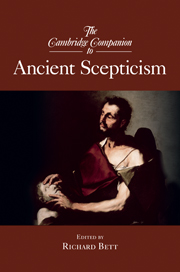Book contents
- Frontmatter
- Introduction
- Part I Origins and Development
- Part II Topics and Problems
- 7 Scepticism and belief
- 8 Scepticism and action
- 9 Scepticism and ethics
- 10 Academics versus Pyrrhonists, reconsidered
- 11 The Pyrrhonian Modes
- 12 Pyrrhonism and medicine
- 13 Pyrrhonism and the specialized sciences
- Part III Beyond Antiquity
- Bibliography
- Index
- Index Locorum
7 - Scepticism and belief
from Part II - Topics and Problems
Published online by Cambridge University Press: 28 March 2010
- Frontmatter
- Introduction
- Part I Origins and Development
- Part II Topics and Problems
- 7 Scepticism and belief
- 8 Scepticism and action
- 9 Scepticism and ethics
- 10 Academics versus Pyrrhonists, reconsidered
- 11 The Pyrrhonian Modes
- 12 Pyrrhonism and medicine
- 13 Pyrrhonism and the specialized sciences
- Part III Beyond Antiquity
- Bibliography
- Index
- Index Locorum
Summary
Ancient scepticism, in its most radical forms, calls into question the place of beliefs, or at least beliefs of a certain kind, in the best life. For the Academic scepticism of Arcesilaus consists in part in the claim that one ought not to have any beliefs at all. And Pyrrhonian scepticism, as Sextus Empiricus describes it in his Outlines of Pyrrhonism, is a way of life characterized above all by the absence of beliefs of a certain kind. Some of the most difficult problems in the interpretation of ancient scepticism are the result of the ancient sceptic’s claim that one ought not to have any beliefs at all or that he himself does not have any beliefs of a certain kind. Here I consider two of these problems. Ordinarily a person claims that p - that it is raining, that the wine is corked, that his wife will be at the party - because he believes that p, and in claiming that p he expresses his belief that p. In the first part of the chapter I examine whether, and how, Arcesilaus can claim that one ought not to believe anything without thereby doing just what he is claiming one ought not to do, namely, believing something. According to Sextus Empiricus the Pyrrhonian sceptic is someone who lacks not all beliefs but all beliefs of a certain kind. In the Outlines of Pyrrhonism Sextus relies on a distinction he does not explicate between beliefs of the kind the Pyrrhonian sceptic, in virtue of his scepticism, lacks and beliefs of the kind his scepticism permits him to have. In the second and longer part of this chapter I try to make sense of this distinction and to identify those beliefs that are, and those beliefs that are not, compatible with Pyrrhonian scepticism.
- Type
- Chapter
- Information
- The Cambridge Companion to Ancient Scepticism , pp. 145 - 164Publisher: Cambridge University PressPrint publication year: 2010
- 8
- Cited by

